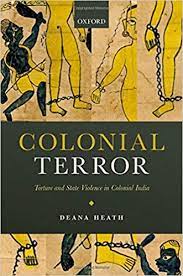Colonial Terror: Torture and State Violence in Colonial India
Focusing on India between the early nineteenth century and the First World War, Colonial Terror explores the centrality of the torture of Indian bodies to the law-preserving violence of colonial rule—of some of the ways in which, in other words, extraordinary violence was embedded in the ordinary operation of colonial states. Although enacted largely by Indians on Indian bodies, particularly by subaltern members of the police, the book argues that torture was facilitated, systematized, and ultimately sanctioned by first the East India Company and then the Raj because it benefitted the colonial regime, since rendering the police a source of terror played a key role in the construction and maintenance of state sovereignty. Drawing upon the work of both Giorgio Agamben and Michel Foucault, Colonial Terror contends, furthermore, that it is only possible to understand the terrorizing nature of the colonial police in India by viewing colonial India as a ‘regime of exception’ in which two different forms, or levels, of exceptionality were in operation, one wrought through the exclusion of particular groups or segments of the Indian population from the law and the other by ‘petty sovereigns’ in their enactment of illegal violence in the operation of the law. It was in such fertile ground, in which colonial subjects were both included within the domain of colonial law while also being abandoned by it, that torture was able to flourish.

Publisher
Oxford University Press
ISBN
9780192893932
Publication date
1 Jan 2021 – 31 Dec 2021
Specialisation
Humanities
Theme
Other
Law
Human Rights
History
Region
South Asia
India